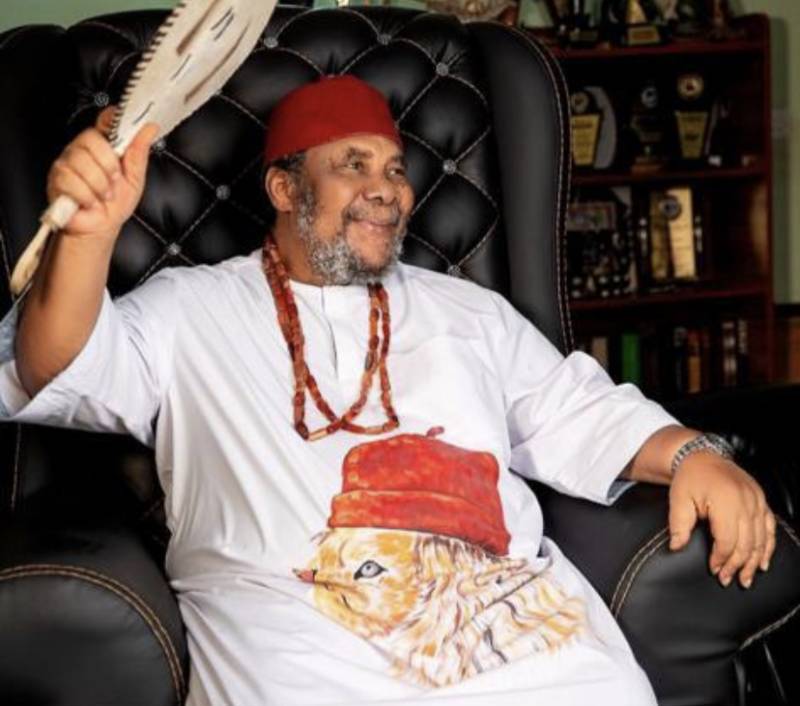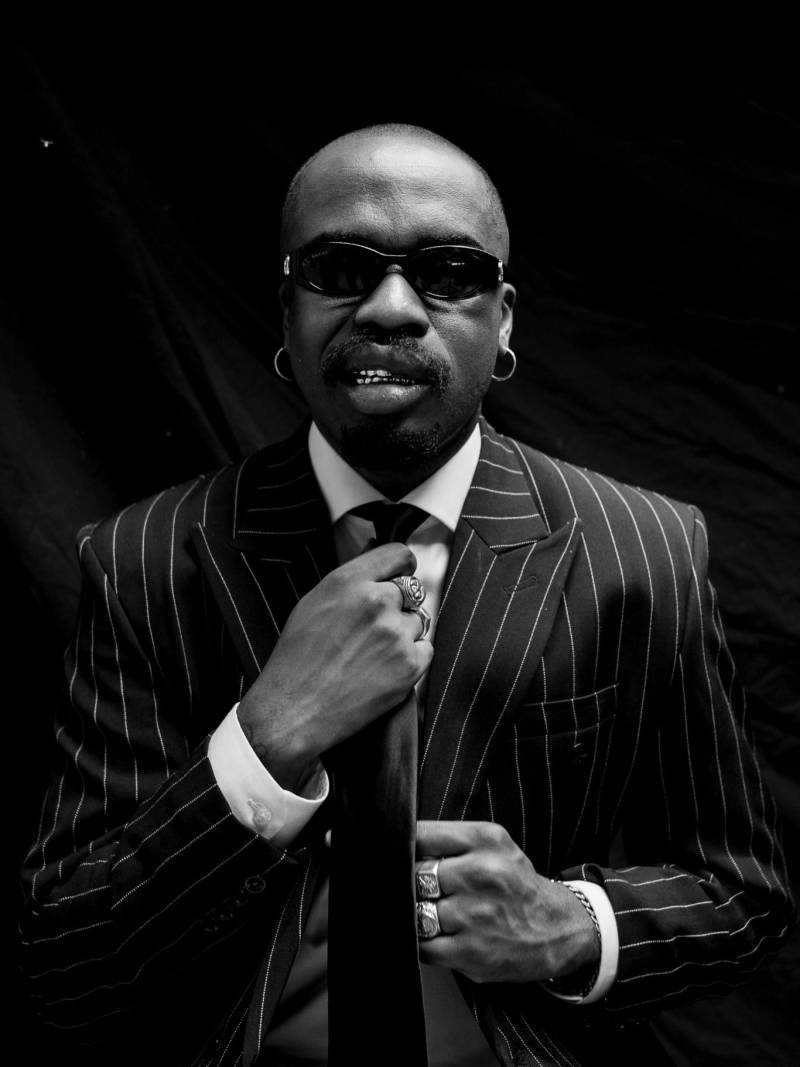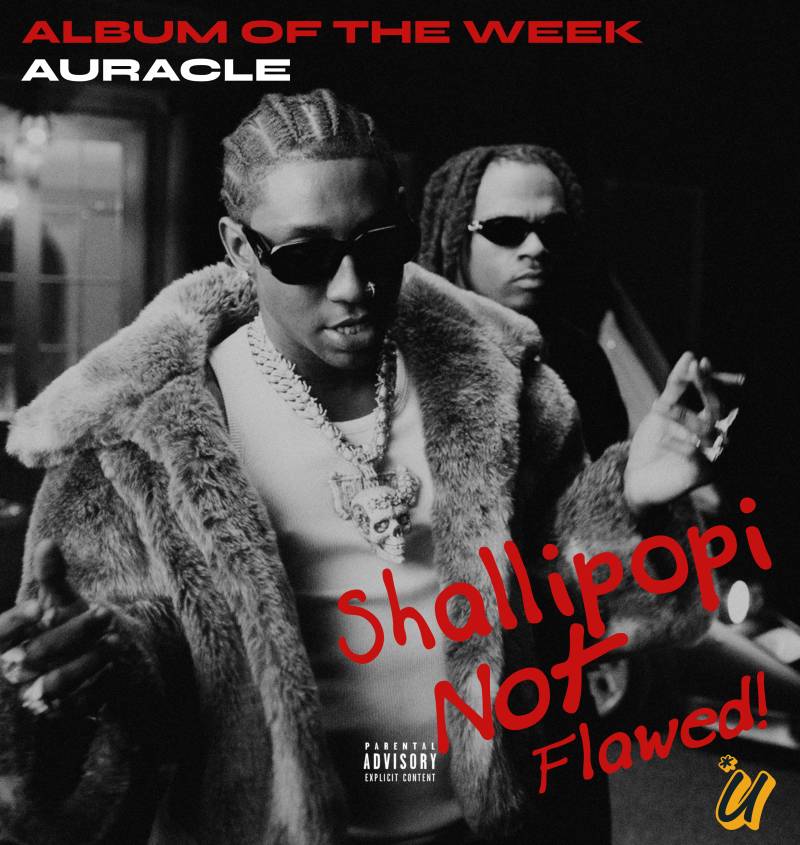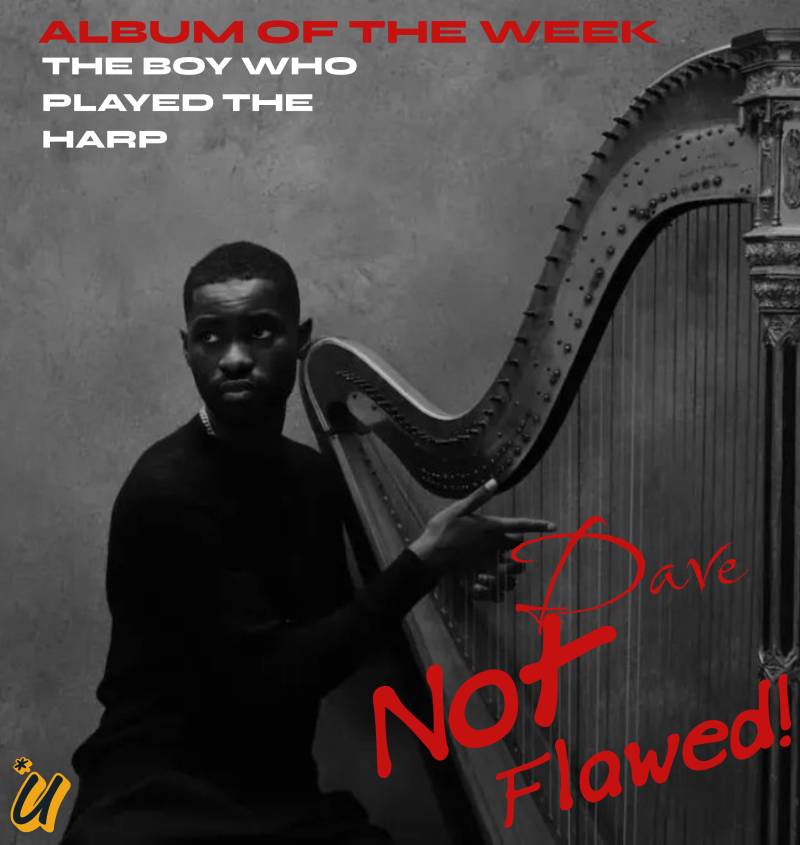If you grew up watching home videos, even before the formation of the now booming movie industry (Nollywood), chances are that Pete Edochie has imparted you. Popular nationwide for perpetually playing the role of a father, Chief Peter Edochie has lived an exemplary life as a renowned broadcaster, having trained at the BBC. He is a veteran actor involved in some of the biggest productions in the world and, most importantly, a father figure — the most traditional one you can think of.
Now 75-years-old, Edochie’s life and career have remained relevant, ensuring that, unlike his peers, he is still a force to be reckoned with, and his antics are regurgitated even today. His eloquence, assertion, and unrivalled wisdom, which becomes more apparent with every word that comes out of his mouth, are some qualities that make him a good father, both on the screen and off it. To celebrate Father’s Day, DOWNTOWN’s Editor, Onah Nwachukwu, speaks to the father of six—and national father figure—about his career in broadcasting in his youth, his midlife transition into the movie industry, and being a father; not only to his biological children, but also to everyone in Nollywood and beyond.
As I walk into his home in Enugu, he is sitting on his chair. A throne of some sort. It is elevated and much higher than other chairs in the house, with a footstool at the base. It certainly gave the aura of power. I greet him in the traditional African way, knees to the ground, and he motions me to stand up while extending his arm in an embrace I walk into. He asks a few questions about me, and in no time, we are talking about culture; then, he teases me about coming to see a chief without kolanuts and how a man knows not to do that. In my defence, I knew this, and had made prior arrangements for Igbo kolanuts, especially for him. Thankfully, they arrived during the interview.
Let’s start from the very beginning. You were 20 years old when you started a career in broadcasting, and you did this for 31 years. What would you say is the difference between journalism then and now?
A lot. The journalists we have today have access to all the information they require, but they never attempt to access it, which is why it is very painful. You see, during the All Africa Games in 1973, we were the people who formed the Broadcasting Organisation of Nigeria. We were taking commentaries; unfortunately, most of us are dead now. Ishola Folorunsho was our master, Ernest Okonkwo was there, Yemi Fadipe was also there, and of course Yinka Craig. While the commentary was going on, you found out that we had details verified of each athlete. But I don’t see it anymore. People just talk; there’s no depth or conviction in their communication, and it’s painful. When people listen to you, they want to learn. A guy like Ernest Okonkwo, for instance- God bless his soul- when he is taking commentaries, and someone is about to take a penalty, he would give you the person’s full football history, how many penalties they’ve taken in the past, those he scored, the ones he lost, etc. That is the work of a broadcaster.
If you send me to go and interview a Gynaecologist, I will, first of all, go into the library and read up all I can on gynaecology. So that if you are talking to that person, there is some measure of authority in your comportment, your delivery, and your questions are incisive.
In fact, the person will ask, “did you study medicine?” I don’t see it anywhere anymore, except for a few people like Ruben Abati, a friend of mine in AIT, Gbenga Aruleba, some on Channels TV, and very few individuals who still do that. Outside that, generally, the performance is very poor. And of course, with language, their presentation is weak, so in the process of asking questions, you insult the person you’re interviewing without knowing it. If you will tell somebody, “On so, and so day, you went to so, and so place and did this…” How are you, sure? Were you there? You did not even investigate. So you don’t throw it at him like that, no. You can quote your source, “so and so newspaper claims that….” Then you have given him some latitude to manoeuvre; let him now say whether it is true or not. So, I’ll tell you the truth; I think we worked harder in our own day than people who are practising now. As a broadcaster, I spent a lot of money collecting records, music, etc, I wanted to make sure I was not found wanting in any of those departments, so I worked extremely hard on my own. Even when I went to train in the BBC, I spent a lot of money collecting classical works because I had made up my mind that if I came back from the BBC, I would start a programme called Music From The Masters where I would feature classical music from the masters; you know them, Mozart, Schubert, Handel, Tchaikovsky, Beethoven, and so on. When I got back and started it, the response was unbelievable, I had listeners like judges, permanent secretaries – people in authority. I rose fast as a broadcaster.
I don’t get inspired listening to them (broadcasters) these days. I mean, somebody came to my house and saw the photograph I took with Zik (Nnamdi Azikwe) when I interviewed him on his 90th birthday. The only observation she made was that I was so handsome in those photographs. She didn’t even know the person I was with. It’s not a surprise, but that’s what we get. Someone saw a picture of me in a suit and was shocked that there was a time I wore suits, but the person standing beside me in that photograph was Chinua Achebe. I don’t know…I am disappointed in the broadcasters of today. They don’t work on their own as we did in those days, and because of that, their knowledge on issues is stunted. There is no depth in their questioning and no conviction in their reporting. Everything is on the surface, and that’s not good. I am not running them down; I’m telling you the truth. When I listen, I want to learn because you never really stop learning. They should research more so that you are some form of fountain of knowledge.
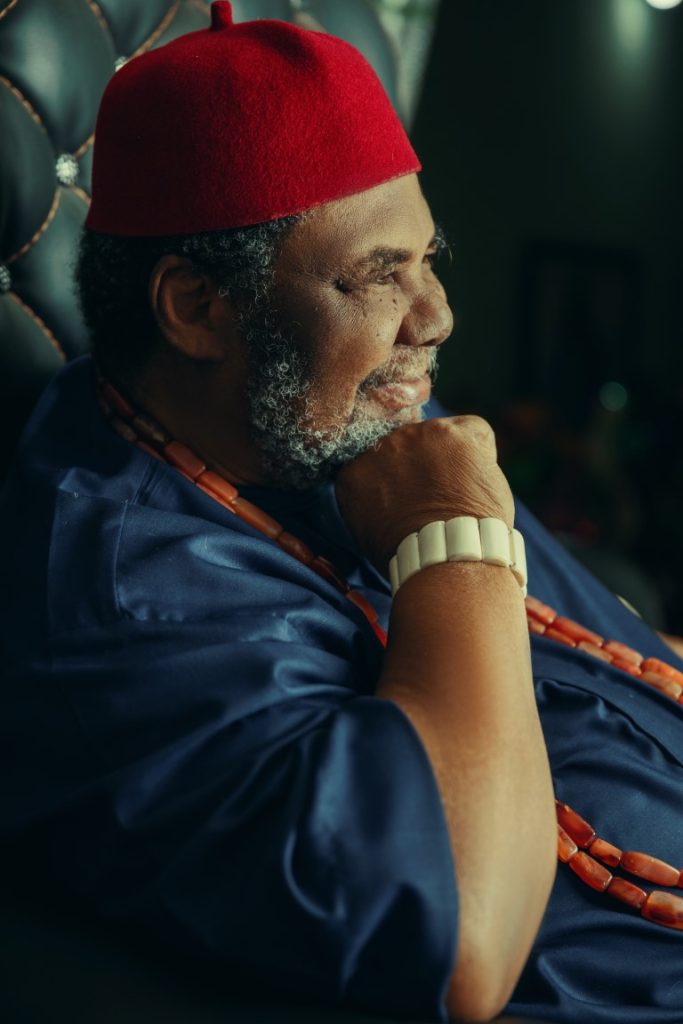
What was it like to transition from a seasoned administrator and broadcaster—an industry you got into at just 20 years old—to the movie industry and become one of the foremost actors of all time?
I think I was lucky to have covered the entire gamut of broadcasting. I did a lot of Shakespeare while I was in broadcasting. In fact, in my third year in secondary school in Kaduna, I did The Merchant of Venice. I did quite some Shakespeare; excerpts of it. I remember when I played Marc Anthony in Julius Caesar.
So you transitioned quite smoothly then.
It wasn’t a problem, that’s what I’m trying to tell you. While I was in broadcasting, I did a lot of drama sketches on television; Sons and Daughters, Every man, and so on.
Would you recall your very first movie on television — Nollywood, as we know it?
First of all, Things Fall Apart is older than Nollywood. When I did it in 1985, Nollywood still slumbered in the womb of time. It had to come on board seven years later. Most of what I did, like Ikuku for Nkem Owoh, was the first one I did after Things Fall Apart. When I did Things Fall Apart, it had been translated into over 53 languages, so it introduced me to the entire world. There was nothing like Nollywood. If you read the compliments the president paid me on my 75th birthday, he said that my performance in Things Fall Apart drew the world’s attention to Nigeria. That’s the biggest compliment I have been paid in my life. I really wish they could give me a copy of it so I can frame it. So Things Fall Apart; that’s the first and the biggest as well. I’ve done other things. And I thank God that everything I’ve done has ended up a smashing success. No production of mine can be referred to as a failure.
Interestingly, you are always portrayed as a father, or a father figure, mostly a strict one. Your typecasting is not shocking, you look the part and play it so well. Thinking back, would you change a thing about that—to play more diverse roles? Or do you think the father role was predestined?
First of all, by the time I left broadcasting and joined Nollywood, I think I was either in my late 50s or early 60s, so I didn’t get in as a young man to start playing lover boy and all sorts. I went in as a father. Again, outside the movie industry, I am, by marriage, the oldest father in the industry. I got married 53 years ago, on the 19th of March, 1969, in St. Finbarrs Catholic Church, Umuahia. There is nobody with that record in Nollywood. I have five sons and a daughter, and a lot of grandchildren. It’s only natural that I play the role of a father, whether a good one or diabolical; it’s a question of detail.
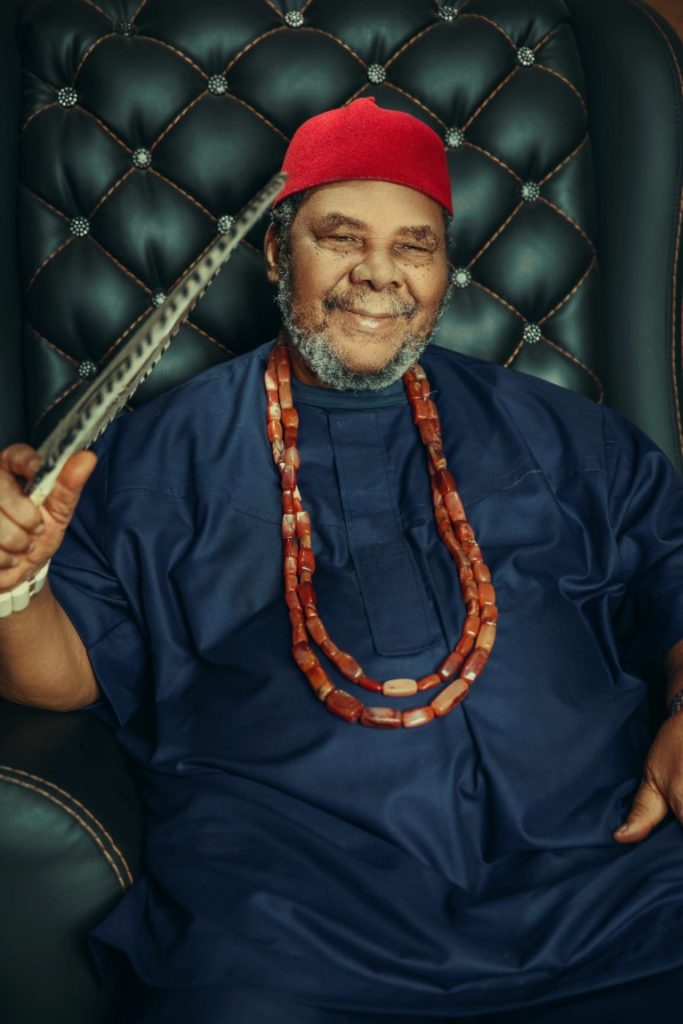
You’re a national father figure. In Nigeria, people think father and think Pete Edochie…
Yes, I’m happy about it.
Do you also share much knowledge on fatherhood with people on the movie set?
Of course, what else would I be doing if not that? If you ask the people in the industry about me, they will tell you, “oh Peter, that’s my father.” For someone like Genevieve (Nnaji), Genny played my daughter in the movie I love most. There was a production we did, and I was hard on her; I had to hug her at the end and say, “look it’s just movie oh.” We became very close, and then we did her movie, Lion Heart. I love her a lot, she took me as a father from day one, and I’ve never forgotten that. Each time people feature pictures of Genevieve, they will always show where she’s leaning towards me as I’m sitting. There was a time on Father’s Day, that was the picture she posted. Now I hear she’s not well and all sorts; I think that’s nonsense, I don’t think there’s anything wrong with her. Other people have played my daughter, but none of them is as close to me as Genevieve.
I once asked a young man, “if your son took your car out on a pleasure binge and came back late, what would you do?” He said, “I’m going to show him that I’m his father.” I said to him, What’s my reaction to what he’d just said? “You’re a bloody idiot.” If you’re a father and your son takes your car for some pleasure ride, you wait. You’re very angry that he took your car and didn’t tell you. When you wait for a particular period, and the car and your son do not return, your anger becomes anxiety. As the night wears on, your anxiety converts to fear. What you’re now asking God is, “let anything happen to the car, but let him come back safely.” That is what makes a father. Many people don’t have that experience, so when they play father, their inexperience shows.
And in playing movie roles?
You see someone playing Igwe, and he is running after a girl and asking her to sit on his lap. When I see things like that, it makes me very angry. That’s a desecration of our culture. There is some sacrosanctity attached to a traditional stool which you must not, under no circumstances, defile. Doing that is defiling that stool. Do you know what that means? There is a saying in hausa; after God, it is you. This is why you will not see an Emir with his wife outside; no. Such expressions are for the weak, and the Emir should not be identified with any form of weakness that characterises mortality. You don’t see a king in bed, etc. It is a demonstration of mortal weakness which should not be identified with somebody who enjoys that kind of aura. Of course, the woman should be there to complete the house, but not while you are The King. You don’t see an Igwe running around singing love songs. As a King, you are entitled to many privileges and mustn’t allow anyone to desecrate them.
How come we’ve never seen a photo of you and your wife together. Does this have anything to do with what you have just said?
Do you mean my wife in real life? There is no need for that now. If you want our family picture, you will see it there. If you want just my wife and me, there’s one that was hanging around there; I don’t know if it’s still there [points to an area in his room]. My wife is a lawyer; she’s been a lawyer for so many years. We don’t go around taking photographs and posing like most of what you see in our industry. It doesn’t make much sense. Then you’ll later see a headline, ‘Pete Edochie and his wife going for shawarma’ or what do you call that nonsense? I don’t have time for that.
I agree that some websites use certain headlines as clickbait.
They have even said I have a place where I record my proverbs. Most of what people attribute to me has absolutely nothing to do with me. For instance, when you asked that we have the interview over the phone, I said, “No, I want to see the person I am speaking to”, so that I don’t get misquoted. If there is no genuiness about your person, I will tell you I am not prepared, I don’t want to interview. With you, when you walked in, I spoke to you about your background, and I was satisfied and knew we would have a great interview. The only thing is you didn’t come with kolanuts (he said with a burst of light-hearted laughter. I responded, saying the kolanuts I arranged for had just arrived).
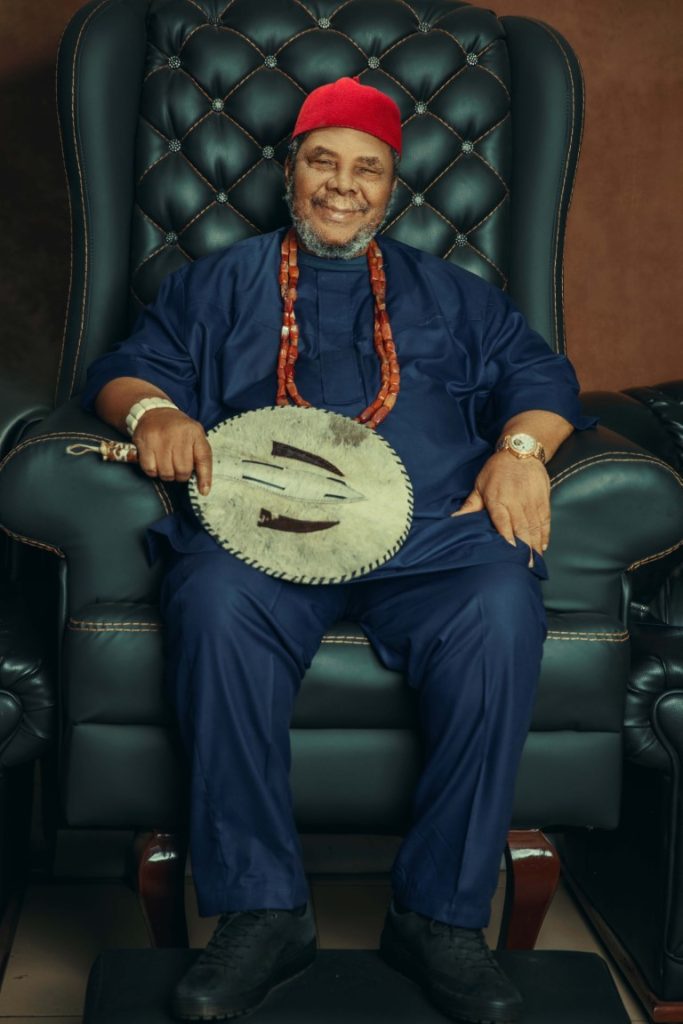
Moving on from fatherhood in the film industry, let’s talk about fatherhood in real life. Take us back to when you had your first child. How did it feel?
It’s indescribable. You can never find words to describe the ecstasy you experience seeing your first child. You ask yourself, ‘this is an extension of me?’ To imagine that you are responsible for this child you’re looking at, you really can’t describe the feeling. You can’t. It’s ecstatic (his voice wandering off while he spoke as if going back in time to that day). There is something celestial about what you experience looking at your first son and knowing that he’s going to carry your name wherever he goes; it’s a wonderful feeling. You get to a stage when he’s no longer your son but a friend. I got married at 22 and had my first son, Leo, when I was 23. He received a title recently, so we speak as titled men.
You brought up your six children in a different time and age. Surely, things are very different nowadays with the influx of social media, which amplifies western culture. Is it possible to merge that western culture with the traditional African parenting style?
Culture is eclectic and dynamic; you pick from sources and strengthen your own culture. Then you throw away the aspect you feel doesn’t compliment or think it is anachronistic. Now, in our culture, women do not lead us. Therefore, you have no business stepping down on one knee and offering a woman a ring. There’s no sense in it. It is the woman who takes a cup of wine, looks around for the husband, identifies him, kneels in front of him, and that is one thing that is being messed up with our productions. First of all, the person giving that cup to the girl sips from it and gives it to her, saying, “show us your husband.” Then she looks around, and when eventually she identifies him, she goes down on her knees, drinks from that cup, and gives it to him, then he drains it. The significance of that is saying, “this is my husband; everything they came with, you can now consume.” Our forefathers were not mad when they instituted most of these things. Today look at the young men wearing earing.
But the Maasai men, who are African, wear earrings.
For the Maasai, it is part of their sartorial expression; for it to be complete, they were large earrings. It is not our culture. I’m not saying they (the new generation) must be like us. Still, you see, the white people wanted to introduce homosexuality into every part of the world but met a brick wall of resistance in Nigeria. Hence, they presented something innocuous and came up with the earrings. Most young men wearing earrings don’t even know how or why it originated. The white people wanted to weave in a very subtle aspect of homosexuality. Even when you see young men with trousers over their lower bum; they don’t realise that it started from when some people were sent to prison and on their return, their trousers couldn’t balance on their waist anymore because they had lost weight, so they wore their trouser below their bum. Our children copy what they don’t understand.
You raised five boys, two of which are now top actors too—Yul and Linc. If you were to give one strong piece of advice to parents today raising kids in this generation, especially fathers, what would it be?
I think Ecclesiastics said if you spare the rod, you spoil the child. If your son does something that’s not proper, flog him. I flogged my children when they were growing up. My father flogged me. My father had seven boys, and he beat the daylight out of us. An incident occurred when he gave us an assignment as he was leaving the house, and the moment he left, we disregarded it to go play football. When he returned, my mother brought out bitter-leaf soup for him to eat. The bitter-leaf was not cleaned at all, so he just took the first morsel and managed to swallow it. Tried the second one, and it was as if he was eating poison, so he dropped it. Then he called me and gave me money to buy a bottle of beer, which I did. When he finished, he called my mother, sent her into the bedroom, locked the door, and brought us out. Listen, I have never forgotten the experience of that day. My father beat the living daylight out of us, and from that day on, we all changed.
On one occasion, my father pretended to have forgotten six pence in one of his shorts. So when we were washing his clothes, we saw that money, and we convinced ourselves that he forgot it, and went and bought sweets with that money. When my father came back, he called us out. “Who took the money that was in my shorts?” (spoken in igbo). So we all looked obliquely at the person who brought that money. The way my father beat us ehn?
Because of our experiences growing up, I sometimes applied the same to my children when I remembered what my father did with us. We also had some beautiful experiences growing up in the north and all what I saw informed my attitude to my children. I don’t howl at them. Yes, I was harsh, and I used the cane when they were in secondary and elementary schools… for instance, but when they got to a point when they started putting on trousers and all that, it became a conversation. You’re no longer howling at them; you are now discussing with them, and this is how all my kids got married. I never told any of them, “don’t marry this woman, over my dead body.” I never selected anybody for any of my children, and I never discouraged any of them. There’s a way you raise your children; they become your friends. My traditional title name is Ono n’enyi (the one sitting on top of an elephant) it means contentment, abbreviated as “Enyi,” which is an elephant, and that’s what all my children call me; none of them calls me daddy. There’s a nexus linking you and your children; it’s a consanguineous bond that nobody can break. So when they refer to you as enyi, everything about you is reflected in that salutation. It is why after my first son took his title, I no longer call him by his name, Leo; I call him by his title Chinemeze, he calls me Enyi, and we talk as titled men. There’s a way you bring your children up; they become your friend at a stage. If I need money now, I call my son, and we talk about it as friends. When I was raising these kids, I left no stone unturned. For you to put five sons through the University…, I never borrowed a kobo from the bank, never swindled anybody. Somehow, the good Lord provided me with the money with which I raised these kids and saw them through the University, and I promised each one of them that if any of them graduated, I’d buy them a car so that they don’t snort their lives out as a result of peer group influence. Beginning with my first son, I bought cars for all five of them. They don’t forget these things. So whenever I say ‘I need this’, all I have to do is let them know, and they all provide it immediately.
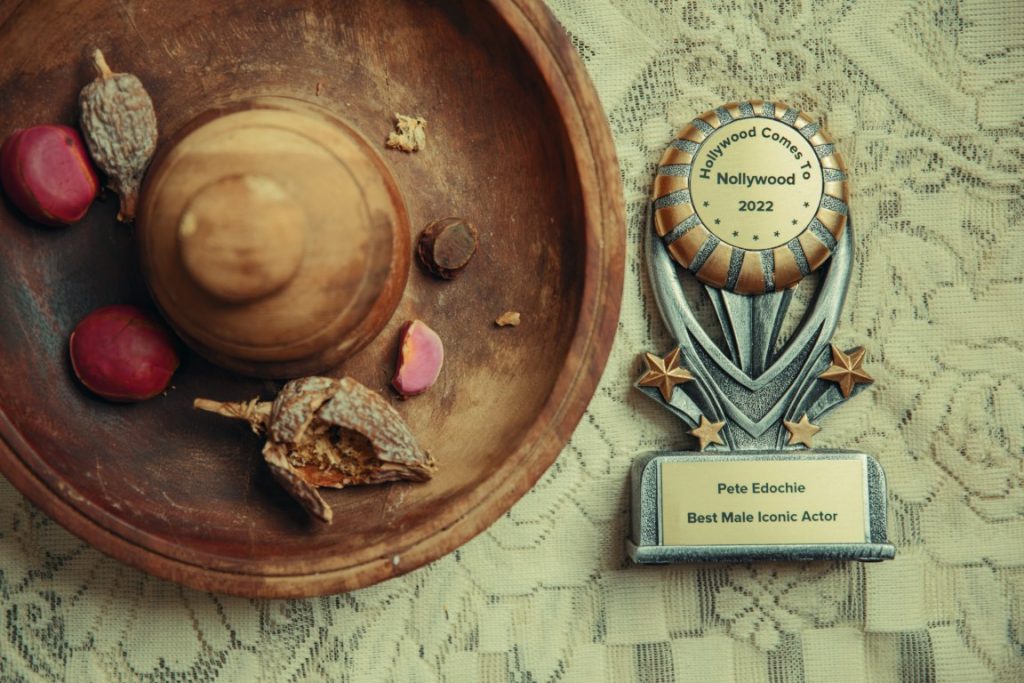
Kolanuts Presented To Pete Edochie (L); One of His Awards (R)
What would you advise fathers generally?
If your daughter or son wants to get married, you owe them an obligation to find out all you can about that family. If a woman, for one reason or the other, is not living with her husband, her daughter is most likely to do the same. It is always like that, I don’t know why. No matter the excuse your son gives you, once the father and mother are alive and they’re not living together, don’t go there. You see, women have more influence on their children than men, and it begins from birth. You’re carrying a child and breastfeeding them; that child is looking at you, so the first face that registers in their memory is the mother’s.
Mentor your children, allow them some freedom to express themselves, then call them and say, “you did this well; it would have been better if you did it this way.” You respect that they’ve become an adult. Some of our people who are old in the industry, the way they talk to the younger ones doesn’t encourage them to aspire, and it’s not good. When I’m on set, I correct privately. If I correct you, you’re the only person who will hear what I say. But some of you scream at the top of your voice to correct the person, forgetting that it took you time to get to where you are. Create the circumstances that will encourage them to aspire, don’t discourage them. This is why I’m a father in the industry: I always try to encourage everybody in the industry as much as possible. I mean, I’m at the very top, make no mistake about it, but when you’re there, call that person quietly. When we are talking about mentoring, I think we should learn to talk to our children properly because they have their own perceptions.
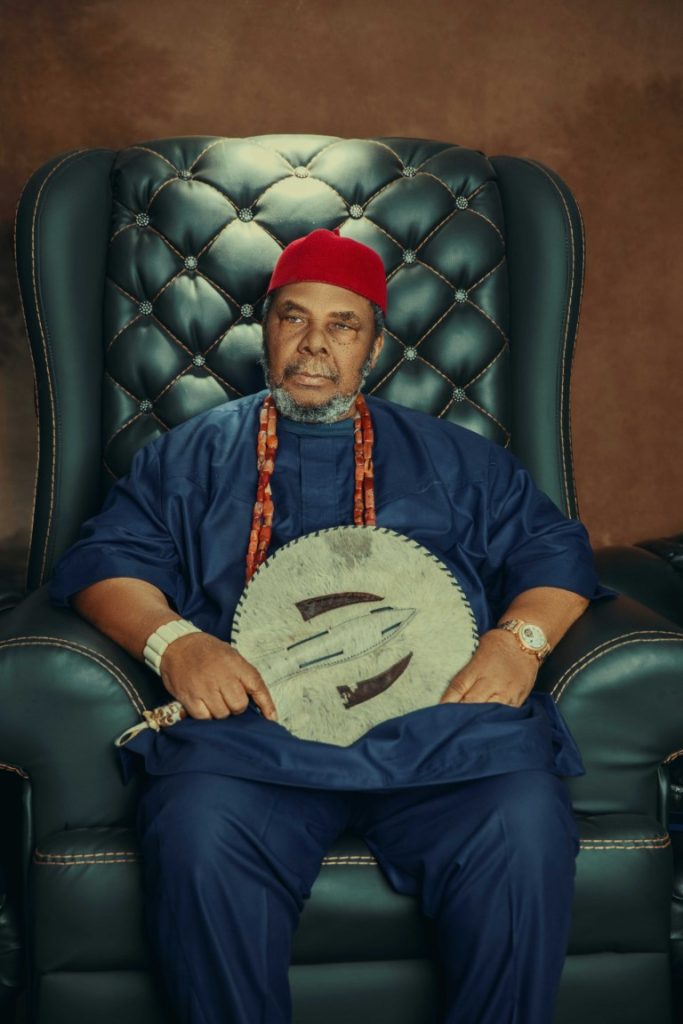
How about the grandkids? Commonly, grandparents who were firmer in raising their children tend to be much softer with their grandchildren. Is that the case with you?
The women; mothers, not the men.
You are not soft on your grandkids?
I don’t believe in doting. Sometimes I indulge, I allow my grandkids be and go upstairs, but ordinarily, I don’t indulge children; it is not my style. You do something wrong, I howl at you. You know grandchildren are not used to sitting in one place. Women indulge children a great deal. If you hear that children are spoiled, most of the time, the women are responsible for it. There’s a saying in my dialect: when you overpamper children, they become useless. They will be useless if you have lots of boys and don’t flog them when they misbehave.
When my children are talking to me, for instance, they don’t put their hands in their pockets; that’s rudeness. If you’re standing before me, put your hands behind you. You don’t sing in front of your father; that is disrespectful. You don’t put your cap on when you’re talking to your father.
Generation Z thinks the older generation’s ideologies are out-dated. You’ve been the subject of a lot of controversies online as a matter of fact, due to your views on society and family dynamics, as not a lot of young people agree with your often conservative and patriarchal views. How do you respond to that?
You see, you have to stand for something. If you’re talking about the culture of a people, you are referring to their way of life. There is some sacrosanctity about it that you must not desecrate no matter the age you belong to. That is what marks a people out. The young men don’t have direction; they get influenced a lot by the west. And that is not in their own interest. My name is Peter, but because I was listening to a broadcaster on the BBC called Pete Miles, I dropped the “R” in my name and used Pete. I had plenty of hair on my head, and I was cutting my hair like a musician called Elvis Presley, and so I was being called Elvis Presley. Just to let you know that we were being influenced by the west then as well. We felt that we knew next to nothing. That whatever it was that we stood for meant nothing compared to the values of their own culture, which they are portraying on screen, so we decided to emulate them. But you get to a stage in your life where you discover yourself and drop all those things.
I don’t quarrel with young men who are experimenting with western culture like we did. But when you consciously debase manhood by wearing earrings. First of all, you ask yourself what you want to achieve by that? We grew up knowing that earrings were meant for women. To be honest with you, most people in our age group find these habits execrable. What do they stand for? It is very easy to say generation gap, we are doing this and that. Those of them who are doing it, what are they trying to prove? Ok, right now in my house, there’s no kind of drink Pete Edochie does not have. The one given to me by the governor of Rivers state, which I hear right now is up to a million Naira. I have others that cost between 250,000 and 450,000. All these things were given to me, and they are still upstairs. Now, I haven’t brought them out to serve my guests. But because I’m a titled person, each time people come to see me from outside the country, I bring out palm wine. If a white man comes to your house and you give him palm wine, he has tasted something that is indigenous to you. Going to give him champagne and all that shows that you have nothing to be proud of. Again, the white people see themselves as equal with their women, right? It is not our culture. That’s what you people want to imbibe. When your husband asks you to get him some water, you remind him that you both just walked in together. That’s not what it ought to be.
This generation gap you people talk about, it’s just that your own generation is misguided, that’s all. It’s just like you buy a car, you mustn’t overspeed to let people know that you’re driving. Let us have a civil society, let us bequeath some legacy onto the succeeding generation, so that they can say we learnt this from so and so people, this is what they left us as a legacy. We’re not asking the young men not to use their initiative or their preferences must be some facsimile with ours, but whatever it is you’re doing, let there be some reason behind it. You are doing something, and the people around you are not learning anything, so what is the essence? That’s what I feel. We’re not saying they’re not doing anything; after all, they belong to the computer age. In our own time, there was nothing like computers. In fact, right now, I am very computer illiterate, and I am very happy about it. But I know that I have a lot of books that I enjoy reading. One thing is that I read extensively; I don’t like somebody to keep telling me about something. When you discuss, you can discuss with compulsive authority and not flirtatiously.
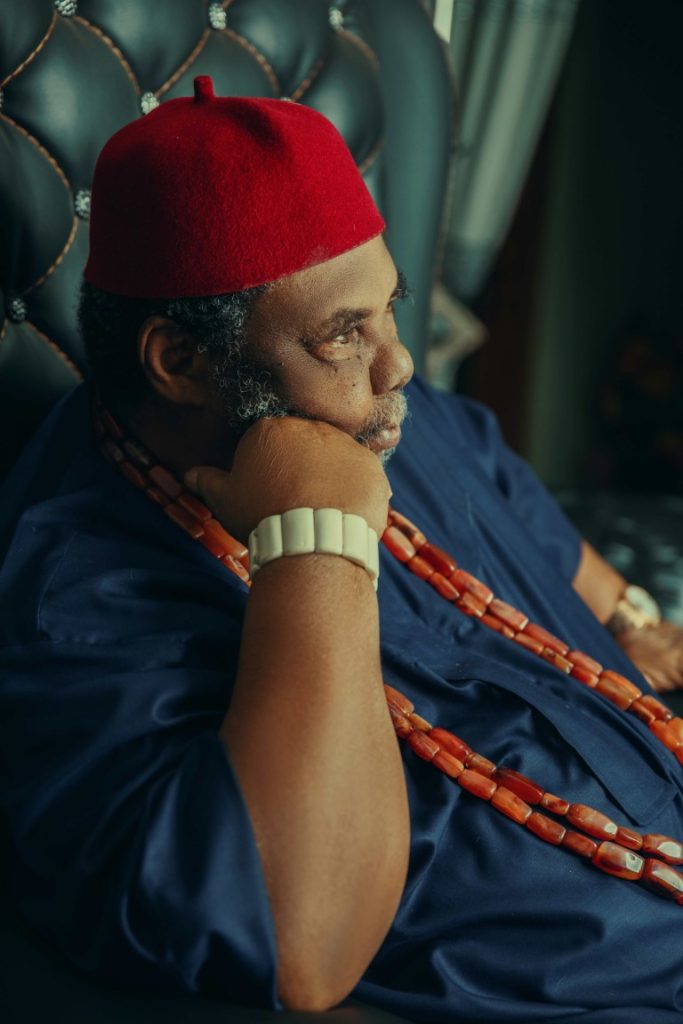
So what is your advice to the young ones?
You people should try to read. Knowledge is buried in books. If you don’t research and arm yourself with this knowledge, you find that wherever you are, people will begin to discuss, and you can’t contribute; you will just be looking at them. We are not saying that the young men shouldn’t exercise their own franchise, but there is always a need for some rationale behind everything you do so you don’t go astray.
People should be moulded. Whatever your interests, some degree of tutelage will help guide you. If you give yourself the impression that you know it all, you are a wiseacre, then you can’t learn anything. But every day in your life, you are always learning until you get into your grave.
Let’s quickly talk about your son Yul. You publicly endorsed him for the 2023 Nigerian presidential election, and then he was found in a lot of controversy surrounding his marriage. What do you think about all of that?
Yul is old enough to take care of his problems. That’s all I can say about that. He’s been living by himself for a long time and married for 17 years. He is a mature man; he is old enough to run his life.
Let’s talk about your chieftaincy. You are a proud Chief and also a proud Catholic. How do you merge both worlds, seeing that tradition and religion don’t exactly see eye to eye?
What is the difference between religion and tradition? I have never been asked to worship or involve myself with any rites. I’m a titled person. If you go to England, there are people they call Barons, they also have social stratification, everybody has where he belongs. It is the same thing. We stratify our cultural society. You don’t have to go and kill a human being for you to be an Ozo-titled man. Essentially, what does it mean? Simple: You have lived a life worthy of emulation. You have represented your society at home properly. You are old enough to be identified as one of those who stand for the truth to now tell things the way they are; you are a titled man. This is why Pete Edochie is sitting here today relaxed. I’m a titled person, and I have a very big title. I have Ogbuefi and Ogbuinyinya. What these traditional medicine men do is exactly what we do as Christians. Yes.
How so?
Our Lord Jesus Christ shed His blood for us, right? If you meet a native doctor, he must necessarily use blood —chicken or ram, because it is a life source. It’s the same thing. Go and interview a native doctor; whatever he does, he always ends it by saying, “akwa ma Chukwu kwe.” (translated to mean: if God almighty agrees) So the white men condemned them out of ignorance. One thing about me is that I don’t discriminate. If I come to your house and you are a native doctor, if you kill a ram or chicken, we shall eat it. I think it was Peter in the bible who said everything created by God is clean.
You are also an elder statesman in the industry; you’ve been active in the movie scene since the 1980s. You have seen everything there is to see across generations. What do you think are the most significant differences between your generation and this? Where are they falling short and how can they improve?
The biggest problem we have is technical, poor sound quality because the people don’t spend money. If you use a microphone attached to your lapel, everything you say is distinct. And that’s what I do when I go to shoot. Number two, we keep replicating our ideas and plots. You can predict most of what we do. I was watching a film last time; I saw Chiwetel Agwu buy something and wouldn’t pay with a cheque; instead, he gave them cash. I predicted what would happen -he would arrange for that same money to be collected by thieves. And that’s exactly what happened. It is not good for our movies to be that predictable.
In 2005, you and seven of your acting colleagues were placed on a one-year ban by the Actors’ Guild of Nigeria for charging huge fees from producers because of your A-list celebrity status. What’s your comment about that?
Nothing. It was done out of ignorance. We don’t all practice at the same level. A man brings a script, wants to feature Pete Edochie, and another young man; if you offer the young man 150,000 Naira, with Pete Edochie, you start with 1.5 million Naira. You know that once you put Pete Edochie’s face on the billboard, everybody wants to know what Pete Edochie did. So there is no way you will compel all of us to charge the same. It doesn’t make sense; it doesn’t happen anywhere in the world. They did it because they enjoyed the monopoly, but it is no longer the same today. Today, we have an appearance fee. If you are doing something in Asaba and want Pete Edochie to be there, you get me a ram first and then pay the appearance fee. And the appearance fee is quite heavy. Ordinarily, announcing to the audience that Pete Edochie will be here on so and so day, there will be a very unhealthy crowd there. Many people want to see me, take photographs with me, you can’t help it now. It happens everywhere. There’s nothing you can do about it. People touch you, and they are trembling.
It’s been 17 years since then. What will you say is different in terms of remuneration and perception (from producers and your colleagues alike) now that you are considerably older?
Today we get paid what we charge. What I want you to pay me is what you will pay. If you can’t pay, you can go look for some other person.
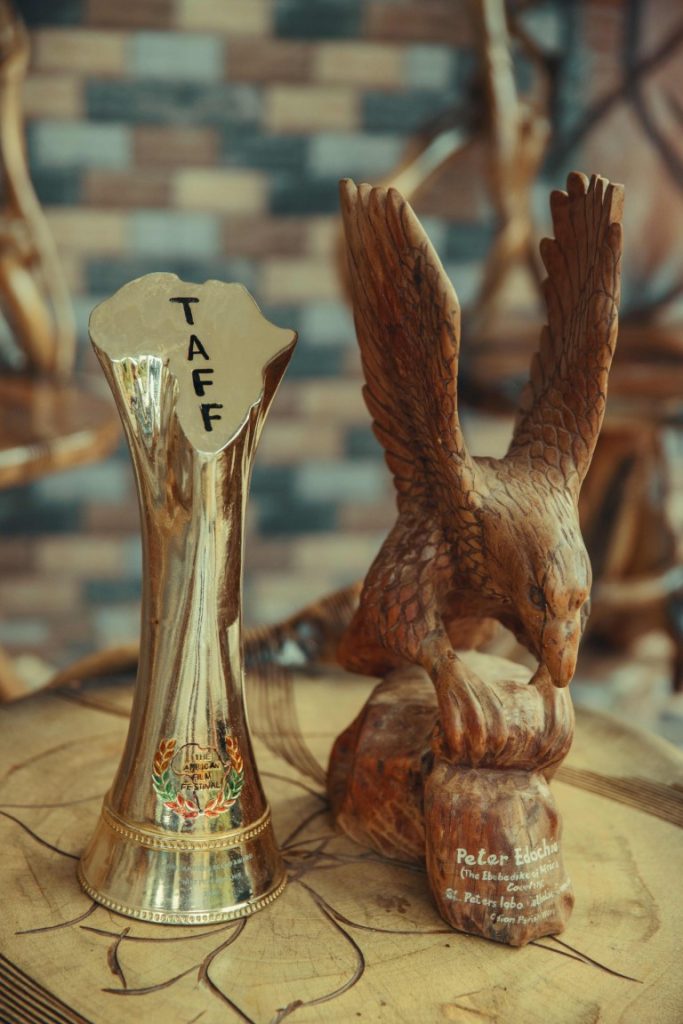
In Hollywood, we see much older people still acting. The late Betty White acted until she was 90, and we still see Jane Fonda, and Michael Douglas in movies. How much longer do you think you will keep acting?
Everything depends on God. If He says, “Pete, you keep going on,” I’ll keep going on. But as long as I have my faculty intact, I’ll be on set. I mean, come on, I’m 75 now; I don’t know for how many more years I will be out here; a lot depends on God. What are you quitting for if you are healthy and can take your lines and all that stuff?
